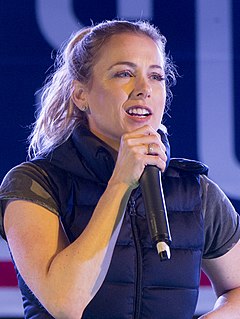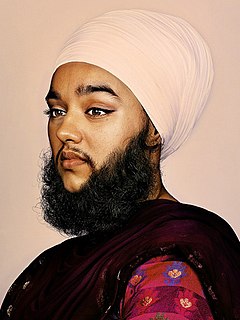A Quote by Rebecca Traister
In the nineteenth century, in part because a ton of American men moved west, in part because of the Civil War, and in part because of trepidation about marriage, which was then a very confining institution, there was a big population of women - mostly middle-class white women on the East Coast - who didn't marry.
Related Quotes
I think that it is true that for me as I observe it, that the Western World tends to be more of , tends to encompass more of, the masculine energy of the planet itself, the planet's population. Whereas the Eastern part of the world tends to encompass more of the planet's population's feminine aspects. And for those reasons the East and the West tend to approach God very much as men and women do. So the differences between East and West are the differences between men and women, largely.
People always ask us women about how we balance our lives. Rarely do they ever ask men this but we are asked this and it makes a lot of sense - balance, right? It sounds right. And of course you do have to balance because otherwise you'd go crazy. And you do have to find ways of doing things in a sensible manner, raising children and all those choices. But then there's a part of creativity which is irrational and which is obsessive and then that's also part of what we do. So, I don't think that's a bad thing. I think that's part of what makes someone good.
Why do we resist giving help to homeless men? In part because we don't understand how our pressure on men to support families often forces men to take transient jobs that are but a step away from homelessness (the death-of-a-salesman jobs, the migrant worker jobs...) and in part because we respond differently to men who fail [than women who fail].
I think the public is very reluctant to get involved in more foreign wars, especially in the Middle East. And they understand, implicitly, that we go to war in the Middle East because of oil. And if we don't want to go to war in the Middle East, then we have to do something about the oil problem. And I think that view is gaining ground in the U.S.
I think there's a part of society that is very for women being confident and being empowered, but I think there's another part of society that feels very threatened by women being powerful. Because of the feminist movement, a lot of women are feeling way more empowered to be themselves and do what they want to do in life.
In the middle of the nineteenth century, the United States embarked on a new relationship with death, entering into a civil war that proved bloodier than any other conflict in American history, a war that would presage the slaughter of World War I's Western Front and the global carnage of the twentieth century.
I feel like I've always had two selves - the part of me that makes films and the part of me that's political, and they haven't really connected that much. Alias Grace talks about things like class and immigration and women's rights, which felt really good. But especially now, there are pressing things to be said. It's a really scary time in the world. It's a very scary thing to have an American president who openly brags about assaulting women and is openly racist. This isn't a moment to be speaking in metaphors.



































